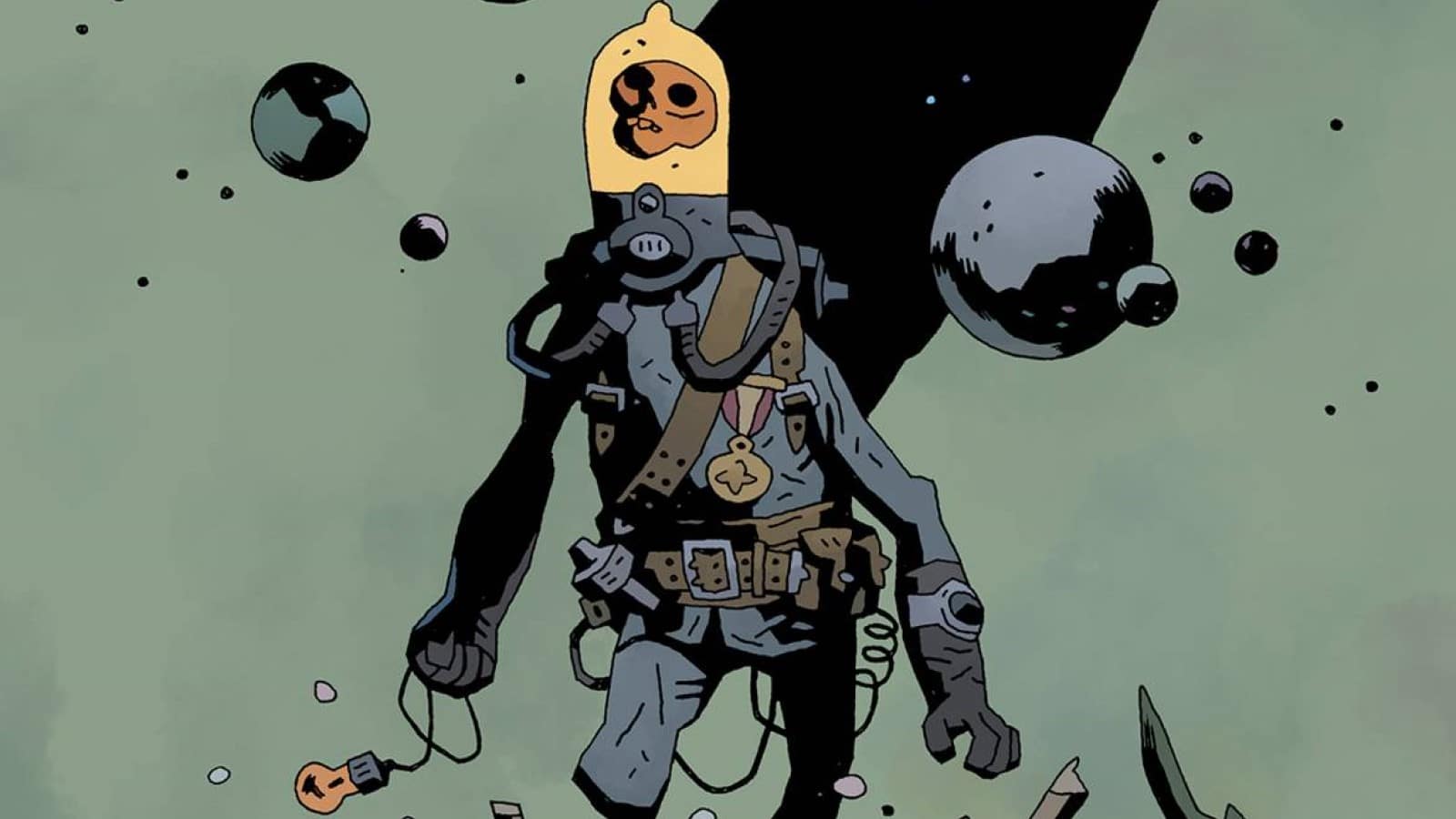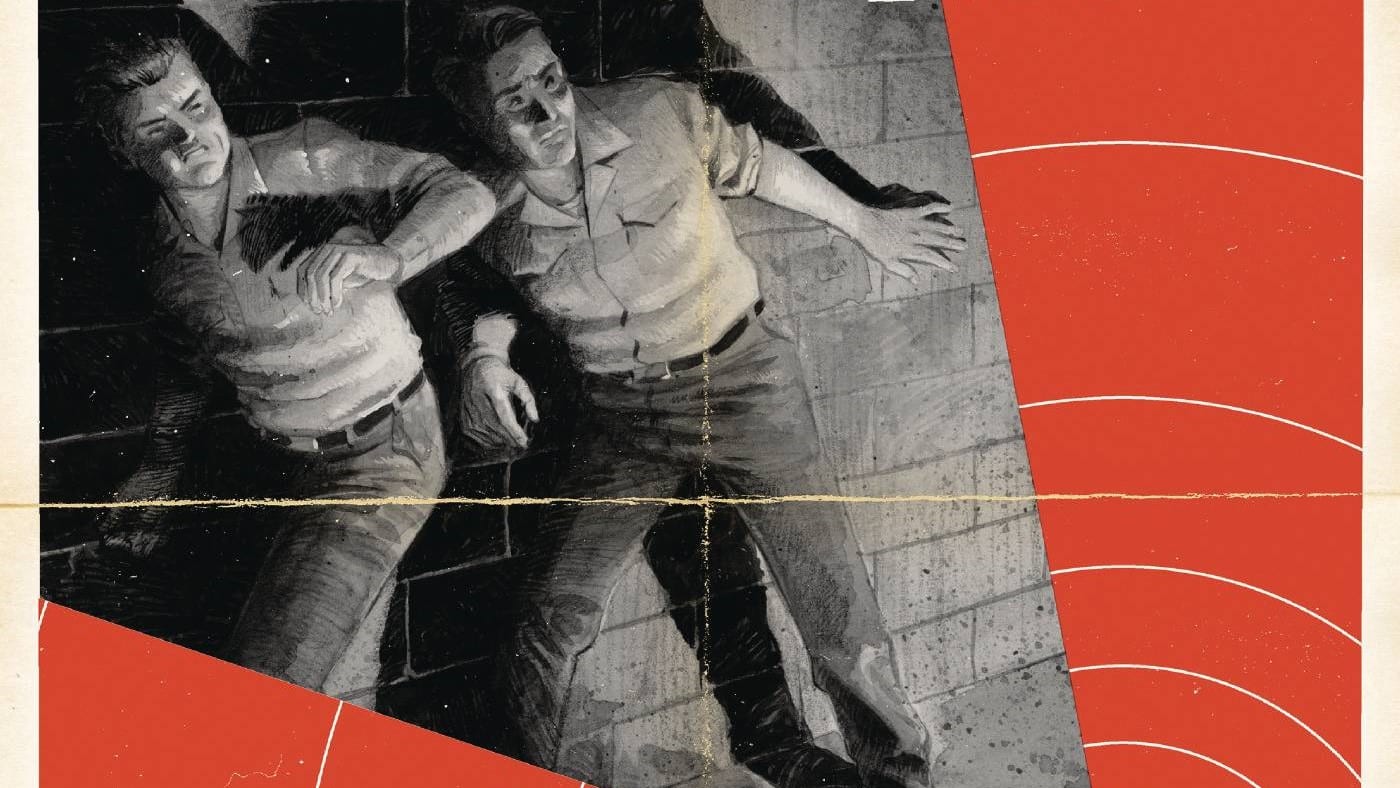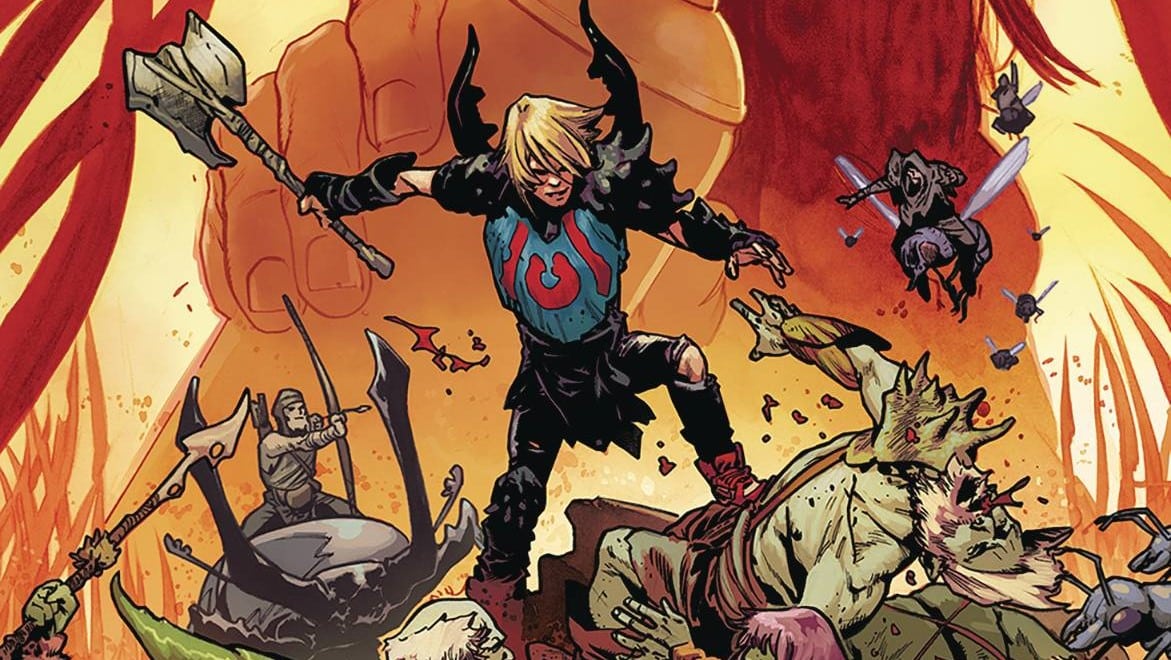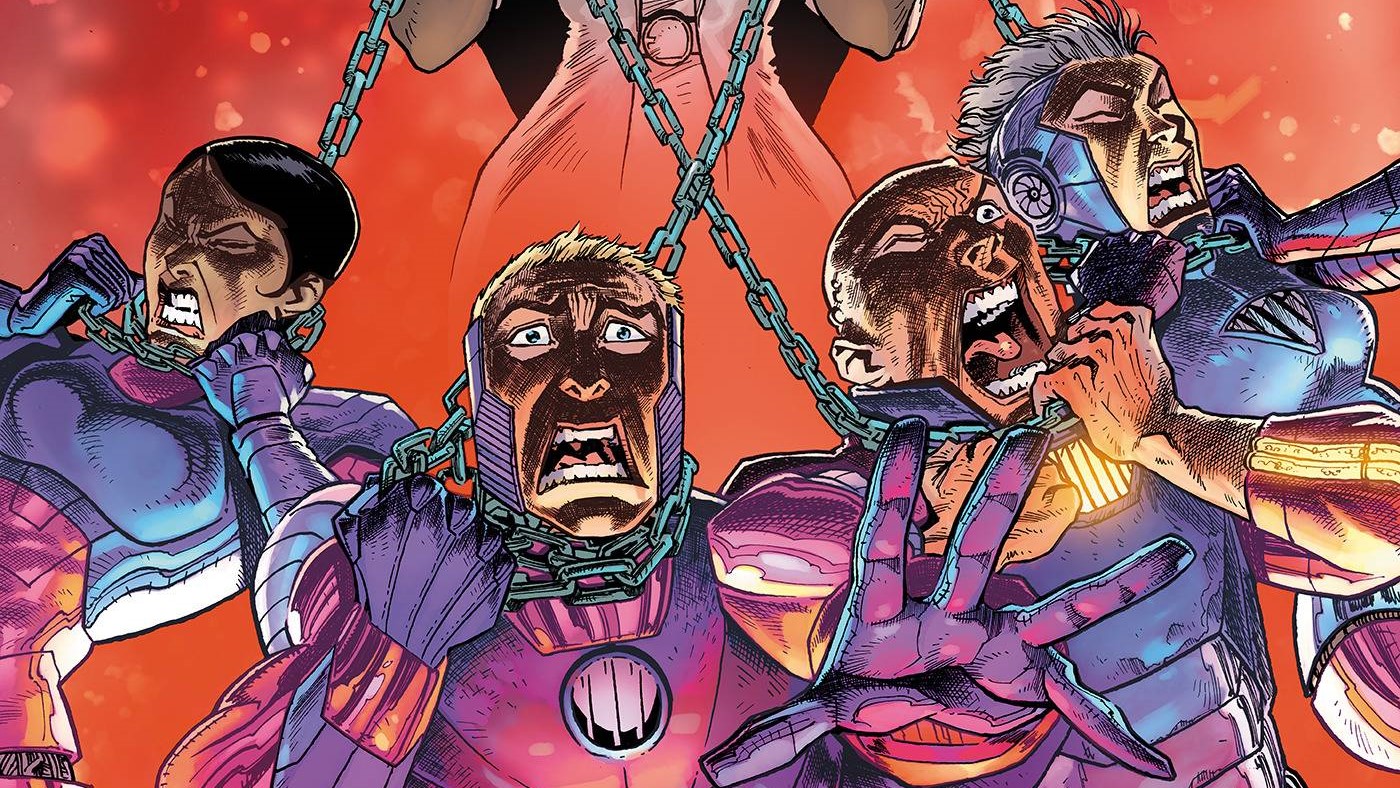If it’s not mobsters dropping dead, it’s the cops. Whatever it is, it’s more trouble for Easton Newburn in Newburn #3 and #4, written by Chip “Big Daddy” Zdarsky, drawn by Jacob Phillips and published by Image.
When the Sun goes down in the Crescent City, a new one rises in Rogue Sun #1, written by Ryan Parrott, drawn by Abel, colored by Chris O’Halloran, lettered by Becca Carey and published by Image.
Ground control to Major Outerspace Guy, you’re cleared for launch in Radio Spaceman: Mission to Numa 4 #1, scripted by Mike Mignola, drawn by Greg Hinkle, colored by Dave Stewart, lettered by Clem Robins and published by Dark Horse.
Will Nevin: Ian, when we started this thing, our idea was to talk older stuff that no one had talked up, to focus on the books still lingering and languishing for attention. And while we’re still on indie books, I’m absolutely disgusted by one thing: Ian, we’ve got three books that are new this week. These aren’t leftovers at all.
Ian Gregory: My god, what have we become? It only took us three weeks to completely lose the theme of this series! But consider this: We knew that these series weren’t going to get reviewed elsewhere on the site, so we preemptively took care of them. It’s like when you’re out to dinner, and you know that your friend isn’t going to eat the leftovers of their meal, so you just take their plate and finish it right there. We’re doing the Minority Report of comics reviews here, people.
Will: Are you accusing me of pre-crime? That’s not nice, Ian.
Newburn #3-4: Still Stupid Good

Will: So. The Black Castle. A neutral ground for the arbitration of disputes between New York’s crime families. Big John Wick/Continental vibes, but I’ll allow it. Anyway, our first case in Newburn #3 is a string of mob murders that has our man confounded — until Emily makes a key discovery. It’s another incredibly solid issue, and the art is especially strong when Newburn confronts the killer. The pacing/structure of this series is really great — one mystery a month that also moves along the larger plot of the book.
Ian: It also opens things up a little more, so we can see more than the two gangs from the previous issues. It gives the reader a sense of scale about organized crime in the city and introduces the major players — which pays off immediately in the next issue, as we’ve been “introduced” to all these syndicates. Issue #3 is another fairly straightforward mystery, and well-constructed, but it also marks the end of what I think of as the “grace period” for new series. I think you can get away with doing unconnected short stories for around three issues before the reader starts to want something a little more connected, with a little more trajectory. Fortunately, the next issue seems to set that up.
Will: You brought it up, so we’ll move on to #4 — “The police are simply another gang” sure does get to the fucking point, doesn’t it? In this one, Newburn is pressed back into police duty when the fuzz can’t solve the murder of one of their own. Again, we’re treated to another stellar fight scene, and Newburn again proves to be the smartest man in the five boroughs. If this is Big Daddy Z’s Batman, sign me the fuck up. [Grote’s note: You’re already signed up, BatChat boy.]
Ian: In particular, I like the focus on New York City’s Police Benevolent Association as a major issue. As a police union, they can operate extralegally as a gang, but then they are tasked to investigate themselves legally. They have both the power afforded by ignoring the laws, and the legitimacy granted by those laws. It gets right to the heart of the hypocrisy of American policing, and I especially like the detail that Emily would much rather work with any of the crime families than with the cops.
Will: Aside from the British spellings, is there anything wrong with this series? I got nothin’. But seriously, you got any theories as to why we continue to see “favours” and “neighbours” and other such nonsense?
Ian: Only other bit of weirdness is the source of the spelling you keep pointing out: Zdarsky is a Canadian white guy writing an American Black woman’s perspective on the cops. Nothing wrong with that on its face (at least, since it’s not the main focus of the series), and I think he does a good job on it (He certainly doesn’t offer up even a shred of police apologia), but it makes me wonder if Zdarsky went for a sensitivity reader or consulted with anyone.
Will: Big Daddy is Canadian? I’m so hurt. The next thing you’ll tell me is that his real name isn’t Chip Zdarsky. (But forreal, I didn’t know that. While he wouldn’t be the first author to do his own lettering, we have to presume Jacob Phillips is the uncredited letterer here.)
Rogue Sun #1: Certainly OK-ish

Will: You ever been to New Orleans? My dad insisted (pre-Katrina) that we see the city before it falls into the Gulf of Mexico, and on another trip, I got to see my college football team win the national championship in a game that likely put the rest of the country to sleep. Generally? I wasn’t impressed.
Ian: I can’t say I’ve been. I’m always happy when a superhero series deigns to acknowledge the existence of a city other than New York (or, even worse, just makes ’em up wholesale rather than attempt to depict any kind of local reality).
Will: The solicit copy places this in the “Image Superhero Universe,” but when I think of that, I think of Spawn and Savage Dragon. I know this is connected to Radiant Black, a series I’ve read exactly one issue of, and that’s about as far as my knowledge goes. You got the dirt on this? Or do I have to “do research” and “care about my work”?
Ian: I’m as out of touch on the Radiant etc.-verse as you are. In fact, that was why I was interested in picking up this series — how well does this work to someone who hasn’t been paying attention to the “main line?” I’m pleased to say that Rogue Sun definitely doesn’t require any prior reading to be comprehensible, and only minimal suspension of disbelief. Turns out, comic readers are primed to accept that superheroes exist as part of your premise.
Will: As far as the actual book goes, we’ve got the anti-Peter Parker — a teen who doesn’t seem all that noble or smart or particularly worthy of superhero-ness — in Dylan, a bully who inherits the mantle of the eponymous title character in a not-at-all contrived “live reading of the will” scene. I felt like this was all pretty off-the-rack stuff — nothing great but more or less competent if you’re going to go for this sort of thing. Did I miss something, or should I have been more amazed?
Ian: No, I’m with you. I do think it’s somewhat interesting to write a legacy character whose original never had their own series, but this is all pretty typical origin story stuff. While Rogue Sun is perfectly comprehensible without any Radiant Black knowledge, I do suspect that they may be banking on their existing fans being willing to give this series a shot beyond the first issue. There’s nothing here that really grabbed me as unique or interesting, and while I can appreciate the novelty of being thrust into a superhero universe mid-stride, essentially, it doesn’t quite save the book from seeming totally rote.
Radio Spaceman #1: Ish That Was OK

Will: This is another one where I feel like I’m missing something. Mike Mignola? Great, sure. But he’s not doing the art here (Greg Hinkle, though, is doing a fine impression, and Dave Stewart is still an all-world colorist), and the script is paper thin. It’s space pulp without any characterization or emotional investment. But it’s pretty to look at?
Ian: How odd is it that Mignola is writing books for an artist to do an impression of Mignola? I’m willing to overlook the strangeness of that in the Hellboy universe, as so much of that world is tied up in Mignola’s unique style and sense of aesthetics, but Radio Spaceman is its own deal. That’s not to diminish Hinkle’s work here, which is wonderful, but the Mignola-as-commodity aspect does throw me off a little.
Will: The formatting is another thing that has me confused. This issue is 20 or so pages and half of a two-part story … and there doesn’t seem to be anything else going on with this character? It’s not an ongoing. It’s not a miniseries. Why not release one 40-page book of whatever this is supposed to be? I dunno, Ian, this whole thing made my head hurt.
Ian: To be honest, this read more like something I would expect to see in a Flight anthology than in a standalone issue. Or told over the course of five issues in backups. It’s extremely thin on dialogue or exposition, not to the series’ detriment, but it definitely comes off as less than fully realized. In fact, there’s very little to say about this other than that it looks good, it’s a fun, pulp-y action romp, and Mignola remains good at funny dialogue and clever designs. I don’t think I’ve ever felt less from such a competently executed comic.
Does This Smell OK?
- “[W]e’re dancing on the tongue of a dragon, just waiting on the teeth to come down.” Fuckin’ a, Big Daddy. Take a bow.
- This came up on the ol’ Spotify while I was reading Rogue Sun. Fun coincidence.
- Another thing that made my head hurt: trying to remember whether it was Rogue Sun or Rogue Son.
- Following up on the horrific leftover news of last week, here are some best practices for all of the stuff you can’t squeeze down your food hole.
- Why the fuck would you be so upset about someone taking “all of the good Thanksgiving leftovers” that you’d write a letter to WaPo’s Miss Manners? You should be grateful, you fucking whiny monster.







